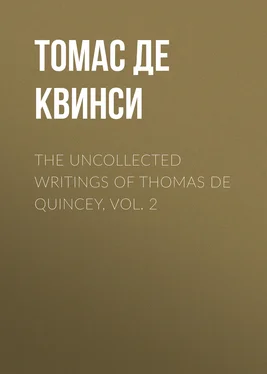Томас Де Квинси - The Uncollected Writings of Thomas de Quincey, Vol. 2
Здесь есть возможность читать онлайн «Томас Де Квинси - The Uncollected Writings of Thomas de Quincey, Vol. 2» — ознакомительный отрывок электронной книги совершенно бесплатно, а после прочтения отрывка купить полную версию. В некоторых случаях можно слушать аудио, скачать через торрент в формате fb2 и присутствует краткое содержание. Жанр: foreign_prose, literature_19, foreign_antique, на английском языке. Описание произведения, (предисловие) а так же отзывы посетителей доступны на портале библиотеки ЛибКат.
- Название:The Uncollected Writings of Thomas de Quincey, Vol. 2
- Автор:
- Жанр:
- Год:неизвестен
- ISBN:нет данных
- Рейтинг книги:3 / 5. Голосов: 1
-
Избранное:Добавить в избранное
- Отзывы:
-
Ваша оценка:
- 60
- 1
- 2
- 3
- 4
- 5
The Uncollected Writings of Thomas de Quincey, Vol. 2: краткое содержание, описание и аннотация
Предлагаем к чтению аннотацию, описание, краткое содержание или предисловие (зависит от того, что написал сам автор книги «The Uncollected Writings of Thomas de Quincey, Vol. 2»). Если вы не нашли необходимую информацию о книге — напишите в комментариях, мы постараемся отыскать её.
The Uncollected Writings of Thomas de Quincey, Vol. 2 — читать онлайн ознакомительный отрывок
Ниже представлен текст книги, разбитый по страницам. Система сохранения места последней прочитанной страницы, позволяет с удобством читать онлайн бесплатно книгу «The Uncollected Writings of Thomas de Quincey, Vol. 2», без необходимости каждый раз заново искать на чём Вы остановились. Поставьте закладку, и сможете в любой момент перейти на страницу, на которой закончили чтение.
Интервал:
Закладка:
The latter jest is intelligible enough, stinging, and witty. As if the young men of the Flavian family could fancy no wives but such as they had won by violence from other men, he affects in a bitter sarcasm to take for granted that Titus, as the first step towards marrying, counselled his friends to marry as the natural means for creating a fund of eligible wives. The primal qualification of any lady as a consort being, in their eyes, that she had been torn away violently from a friend, it became evident that the preliminary step towards a Flavian wedding was, to persuade some incautious friend into marrying, and thus putting himself into a capacity of being robbed. How many ladies that it was infamous for this family to appropriate as wives, so many ladies that in their estimate were eligible in that character. Such, at least in the stinging jest of Lamia, was the Flavian rule of conduct. And his friend Titus, therefore, simply as the brother of Domitian, simply as a Flavian, he affected to regard as indirectly providing a wife, when he urged his friend by marrying to enrol himself as a pillagee elect.
The latter jest, therefore, when once apprehended, speaks broadly and bitingly for itself. But the other—what can it possibly mean? For centuries has that question been reiterated; and hitherto without advancing by one step nearer to solution. Isaac Casaubon, who about 230 years since was the leading oracle in this field of literature, writing an elaborate and continuous commentary upon Suetonius, found himself unable to suggest any real aids for dispersing the thick darkness overhanging the passage. What he says is this:—'Parum satisfaciunt mihi interpretes in explicatione hujus Lamiæ dicti. Nam quod putant Heu taceo suspirium esse ejus—indicem doloris ob abductam uxorem magni sed latentis, nobis non ita videtur; sed notatam potius fuisse tyrannidem principis, qui omnia in suo genere pulchra et excellentia possessoribus eriperet, unde necessitas incumbebat sua bona dissimulandi celandique.' Not at all satisfactory to me are the commentators in the explanation of the dictum (which is here equivalent to dicterium ) of Lamia. For, whereas they imagine Heu taceo to be a sigh of his—the record and indication of a sorrow, great though concealed, on behalf of the wife that had been violently torn away from him—me, I confess, that the case does not strike in that light; but rather that a satiric blow was aimed at the despotism of the sovereign prince, who tore away from their possessors all objects whatsoever marked by beauty or distinguished merit in their own peculiar class: whence arose a pressure of necessity for dissembling and hiding their own advantages. ' Sic esse exponendum ,' that such is the true interpretation (continues Casaubon), ' docent illa verba [LAUDANTI VOCEM SUAM],' (we are instructed by those words), [to one who praised his singing voice, &c.].
This commentary was obscure enough, and did no honour to the native good sense of Isaac Casaubon, usually so conspicuous. For, whilst proclaiming a settlement, in reality it settled nothing. Naturally, it made but a feeble impression upon the scholars of the day; and not long after the publication of the book, Casaubon received from Joseph Scaliger a friendly but gasconading letter, in which that great scholar brought forward a new reading—namely, ευτακτω, to which he assigned a profound technical value as a musical term. No person even affected to understand Scaliger. Casaubon himself, while treating so celebrated a man with kind and considerate deference, yet frankly owned that, in all his vast reading, he had never met with this strange Greek word. But, without entering into any dispute upon that verbal question, and conceding to Scaliger the word and his own interpretation of the word, no man could understand in what way this new resource was meant to affect the ultimate question at issue—namely, the extrication of the passage from that thick darkness which overshadowed it.
' As you were ' (to speak in the phraseology of military drill), was in effect the word of command. All things reverted to their original condition. And two centuries of darkness again enveloped this famous perplexity of Roman literature. The darkness had for a few moments seemed to be unsettling itself in preparation for flight: but immediately it rolled back again; and through seven generations of men this darkness was heavier, because less hopeful than before.
Now then, I believe, all things are ready for the explosion of the catastrophe; 'which catastrophe,' I hear some malicious reader whispering, 'is doubtless destined to glorify himself' (meaning the unworthy writer of this little paper). I cannot deny it. A truth is a truth. And, since no medal, nor riband, nor cross, of any known order, is disposable for the most brilliant successes in dealing with desperate (or what may be called condemned ) passages in Pagan literature, mere sloughs of despond that yawn across the pages of many a heathen dog, poet and orator, that I could mention, the more reasonable it is that a large allowance should be served out of boasting and self-glorification to all those whose merits upon this field national governments have neglected to proclaim. The Scaligers, both father and son, I believe, acted upon this doctrine; and drew largely by anticipation upon that reversionary bank which they conceived to be answerable for such drafts. Joseph Scaliger, it strikes me, was drunk when he wrote his letter on the present occasion, and in that way failed to see (what Casaubon saw clearly enough) that he had commenced shouting before he was out of the wood. For my own part, if I go so far as to say that the result promises, in the Frenchman's phrase, to 'cover me with glory,' I beg the reader to remember that the idea of 'covering' is of most variable extent: the glory may envelope one in a voluminous robe—a princely mantle that may require a long suite of train-bearers, or may pinch and vice one's arms into that succinct garment (now superannuated) which some eighty years ago drew its name from the distinguished Whig family in England of Spencer. Anticipating, therefore, that I shall —nay, insisting, and mutinously, if needful, that I will —be covered with glory by the approaching result, I do not contemplate anything beyond that truncated tunic, once known as a 'spencer,' and which is understood to cover only the shoulders and the chest.
Now, then, all being ready, and the arena being cleared of competitors (for I suppose it is fully understood that everybody but myself has retired from the contest), thrice, in fact, has the trumpet sounded, 'Do you give it up?' Some preparations there are to be made in all cases of contest. Meantime, let it be clearly understood what it is that the contest turns upon. Supposing that one had been called, like Œdipus of old, to a turn-up with that venerable girl the Sphinx, most essential it would have been that the clerk of the course (or however you designate the judge, the umpire, &c.) should have read the riddle propounded to Greece: how else judge of the solution? At present the elements of the case to be decided stand thus:—
A Roman noble, a man, in fact, of senatorial rank, has been robbed, robbed with violence, and with cruel scorn, of a lovely young wife, to whom he was most tenderly attached. But by whom? the indignant reader demands. By a younger son 8 8 But holding what rank, and what precise station, at the time of the outrage? At this point I acknowledge a difficulty. The criminal was in this case Domitian, the younger son of Vespasian, the tenth Cæsar, younger Brother of Titus, the eleventh Cæsar, and himself, under the name of Domitian, the twelfth of the Cæsars, consequently the closing prince in that series of the initial twelve Cæsars whom Suetonius had undertaken to record. Now the difficulty lies here, which yet I have never seen noticed in any book: was this violence perpetrated before or after Domitian's assumption of the purple? If after , how, then, could the injured husband have received that advice from Titus (as to repairing his loss by a second marriage), which forms part of an anecdote and a bon-mot between Titus and Lamia? Yet again, if not after but before, how was it Lamia had not invoked the protection of Vespasian, or of Titus—the latter of whom enjoyed a theatrically fine reputation for equity and moderation? ––'the unbroken dream entangled me In long orations, which I strove to plead Before unjust tribunals,—with a voice Labouring, a brain confounded, and a sense, Death-like, of treacherous desertion, felt In the last place of refuge—my own soul.'—H.]
of the Roman emperor Vespasian.
Интервал:
Закладка:
Похожие книги на «The Uncollected Writings of Thomas de Quincey, Vol. 2»
Представляем Вашему вниманию похожие книги на «The Uncollected Writings of Thomas de Quincey, Vol. 2» списком для выбора. Мы отобрали схожую по названию и смыслу литературу в надежде предоставить читателям больше вариантов отыскать новые, интересные, ещё непрочитанные произведения.
Обсуждение, отзывы о книге «The Uncollected Writings of Thomas de Quincey, Vol. 2» и просто собственные мнения читателей. Оставьте ваши комментарии, напишите, что Вы думаете о произведении, его смысле или главных героях. Укажите что конкретно понравилось, а что нет, и почему Вы так считаете.












